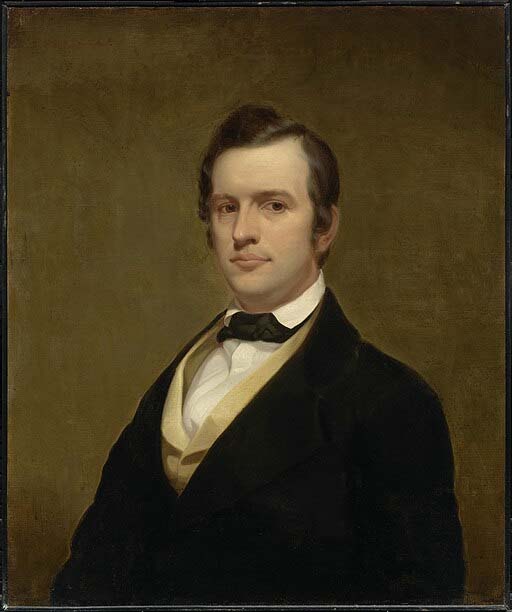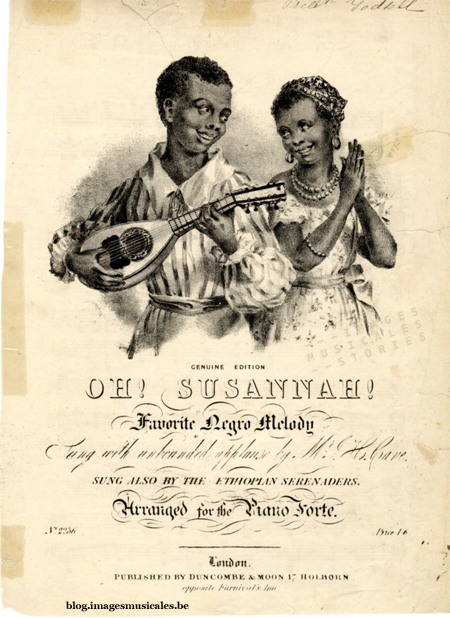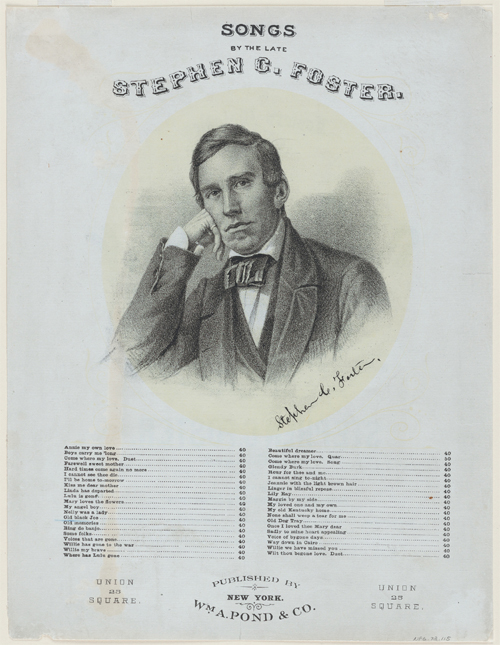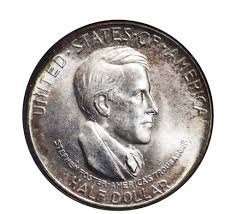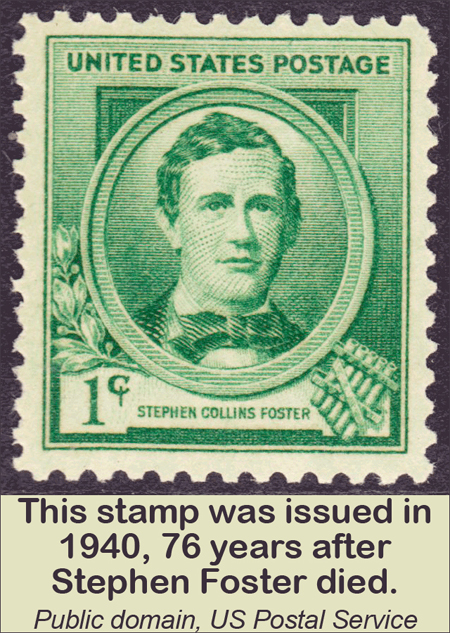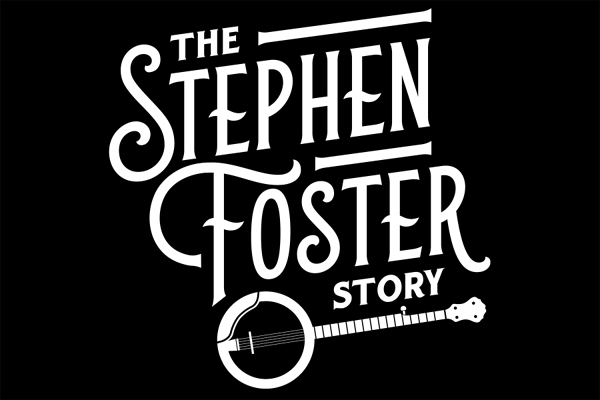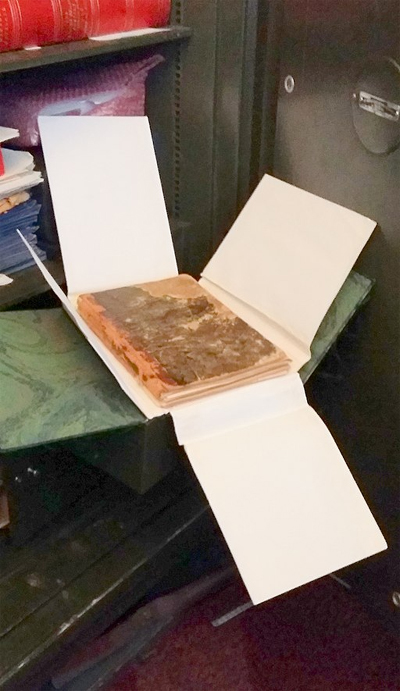STEPHEN COLLINS FOSTER
Stephen Collins Foster (1826-1864) is considered one of our country’s most famous 19th century composers, 'the father of American music,' and the first professional American composer. He wrote over 200 folk songs and instrumental compositions about the America of his era, some of which remain popular today. It is possible that he may be the most recognizable American composer in other countries as well.
Up
until the 1960s, school children learned the songs written by Foster. These
included 'Old Folks at Home' (Swanee River),'Oh! Susanna,' 'My Old Kentucky Home,' 'Beautiful
Dreamer,' 'Camptown Races,' and 'Jeanie With the Light Brown Hair.'
Unfortunately,
some of Stephen Collins Foster's lyrics, though generally accepted in his time, are considered racist in today’s America, which has had the effect of limiting the playing of some of his music.
STEPHEN COLLINS FOSTER
SONGS
The compositions of Stephen Collins Foster were the first genuinely American-themed songs, depicting the love of home, the American temperament, river life and work, politics, battlefields, slavery and plantation life.
Composers in Foster’s era did not own copyrights on their
music. They either produced songs while under contract to a music producer or
sold individual songs to them outright, usually for a pittance.
Most of Foster’s handwritten music manuscripts have been lost because he usually sent his handwritten scores directly to his publishers. These publishers kept the sheet music manuscripts. They did not give them to libraries or return them to his heirs. However, editions of his songs issued by the publishers of his day can be found in many collections.
His poems and melodies were written in a simple manner with very little musical embellishment or complexity. Many of his songs had Southern themes, yet he had never lived in the South and only visited it once.
'Oh! Susanna' was
written by Foster when he was 21 and it launched his career. That song became
the anthem for the California Gold Rush. 'My Old Kentucky Home' was adopted as the state song of Kentucky in 1928. 'Old Folks at Home,' also known as 'Swanee River' became the state song of Florida in 1935.
Many early filmmakers used Foster’s songs for their work since there were no copyrights and they could use them at no cost. Just one very famous example of this was the 1949 film, Mighty Joe Young, when the main character is able to calm her pet 12-foot-tall gorilla by playing Foster’s 'Beautiful Dreamer.'
STEPHEN COLLINS FOSTER
BIOGRAPHY
CHILDHOOD
Although there are many biographies written on Stephen Collins Foster, the details tend to differ widely. The reason for this is that his brother destroyed much of the information that he felt would reflect negatively upon the family after the death of his brother, Stephen.
We do know he was born on July 4, 1826 in a small village east
of Pittsburgh, Pennsylvania to a family that was politically and socially
prominent. He had 3 older sisters and six older brothers.
The Foster family generated significant wealth and status from the exploitation of enslaved laborers. Thus, although his family lived in the North, they did not support the abolition of slavery. The family profited greatly from cotton picked by enslaved blacks in the South. One brother, Dunning, was a partner in a steamship company in Cincinnati, Ohio, and shipped goods along the Mississippi and Ohio rivers. Another brother, Morrison, in Pittsburgh, supplied Dunning with many contracts to ship cotton to Pittsburgh’s cotton factories.
Since the family was for a time members of the elite in Pittsburgh, they employed servants that were lower in social standing to do the chores normally left for the children. This left free time for the children to spend attending school and making music. Stephen attended several private academies in Pennsylvania and even spent a brief time at what is now Washington & Jefferson College.
From his earliest childhood, Stephen Collins Foster showed extraordinary talent. He taught himself how to play the clarinet, guitar, flute, and piano. At 10 he performed popular comic songs with a group of local boys. Foster’s neighborhood included many European immigrants and he was used to hearing the music of the German, Italian, Scots-Irish, and English. He studied the songs circulating in American during the 1820s, 30s, and 40s which included American minstrel songs, German lieder, Irish melodies, Scottish ballads, English pleasure garden sings, Italian opera, and African American religious music.
Although he had no formal instruction in composition, a music dealer in Pittsburgh helped him with this and encouraged him. He composed his first song at age 14, entitled the 'Tioga Waltz.' His first published song was 'Open thy Lattice Love.' At 18, he began composing blackface minstrel songs. These were the melodies that made him famous and ultimately caused him to be criticized as racist.
MOVE TO CINCINNATI
In 1846, Foster moved to Cincinnati, Ohio and became a bookkeeper for his brother, Dunning, in Cincinnati. Here he wrote 'Oh Susanna' and in 1849 he published 'Foster’s Ethiopian Melodies, 'which included the song, ' Nelly Was a Lady.' To his credit, he was actually the first lyricist to refer to an African-American woman as a lady.
BACK TO PITTSBURGH IN 1850
Foster returned to Pennsylvania in 1850 and contacted the founder of The Christy Minstrels, the most famous minstrel troupe of the day. An arrangement was made for the show to be the first to introduce his songs, a relationship that remained profitable for both parties for many years.
On July 22, 1850, Foster married Jane Denny McDowell. Their only child, a daughter named Marion, was born in 1851. The ballad, ‘Jeannie with the Light Brown Hair’ was one of the songs he composed for his bride. Most of his best-known songs were written in Pittsburgh in the first half of the 1850s.
Due in part to the lack of copyright protection for his songs and even though by 1853, Foster had an exclusive contract with music publisher Firth, Pond, and Company, his financial situation became unstable. The union of Jane and Stephen had become a series of separations and reconciliations. After many conflicts with his wife, they separated in 1854.
With the death of his parents and one brother in 1855, it is thought that Foster became quite depressed. Further, in 1857, his brother sold the house where he had been living, leading to more financial difficulties for Foster. In order to make ends meet, he sold the rights to future royalties from his already-published songs in exchange for one-time cash payments from Firth, Pond & Co. and received advance payments on future songs.
Unfortunately his alcoholism increased, his health declined, and the quality of his creative output greatly diminished in the last half of the 1850s.
MOVE TO NEW YORK
Foster’s last 4 years were spent in NYC .Foster moved from Pittsburgh to New York in 1860 to be closer to the music publishing world. He focused on producing parlor music such as 'Beautiful Dreamer.'
His reputation grew but he still found it difficult to earn enough money. He produced a tremendous amount of songs in New York. In many of his songs, he tended to take contradictory stands. For example, he would write derogatory minstrel songs while also authoring many church hymns. He wrote songs in support of drinking while also composing temperance songs. He wrote quite a few songs about the Civil War which began in 1861. Some if these were pro-Union and yet others were anti-war songs.
The comic songs he wrote during this time were featured in saloons in variety shows. These shows were very popular and eventually developed into vaudeville in the decades after the war.
DEATH
On January 10, 1864, Stephen Collins Foster grew ill and apparently fell in the bathroom in his hotel room, though there are other suppositions about his death, one is that he actually committed suicide. (If that was the case, his family would have covered it up.) He died on January 13th, 1864. When he died, his wallet contained a scrap of paper that simply said, “Dear friends and gentle hearts,’ along with 3 pennies. His brother, Morrison, retrieved his body and on January 21, He as buried in Allegheny Cemetery in Pittsburgh.
WAS STEPHEN COLLINS FOSTER A RACIST?
In recent years, Foster’s music is little used because of its apparent longing for the old order of slavery and for his participation in black-face minstrel shows, now considered racist.
Foster’s understanding of African American music was not shaped through direct contact but rather through songs by white musicians that negatively caricatured blacks and their musical practices. These songs were commonly referred to as Ethiopian songs.
Blackface songs, those used in the minstrel shows of Foster’s day were vulgar and crude. And yes, they were also racist and dehumanized the African Americans whom the songs were about. It should be noted that after Foster sold his songs, he had no control over how they were used.
In Foster’s time in America, minstrel shows were a very popular form of public entertainment and had gained such popularity that they became a separate musical art form by 1848 and were more readily accessible to the general public than opera! Unfortunately, they showed African Americans as buffoons, lazy, dim-witted, superstitious, etc
Even though it may seem to some of Stephen Collins Foster’s songs can appear to disparage African Americans or are racist, as he grew as an artist, he became more and more concerned with the lyrics. Even though he continued to use the coarse black dialect of the blackface songs, his lyrics began to give black Americans greater dignity.
Though it would be a leap to say Foster favored abolition, it sees more likely that he was attempting to push his sheet-music sales with family-friendly language. However, abolitionists viewed his songs and performed them to help persuade more people to support the abolition of slavery. Some of his compositions were used in theatrical productions of Harriet Beecher Stowe’s abolitionist novel Uncle Tom’s Cabin.
The lyrics of My Old Kentucky Home, specifically, 'Tis summer, the darkies are gay,' were considered offensive and showing disrespect toward African-Americans and were officially changed to ''Tis summer, the people are gay.'
STEPHEN COLLINS FOSTER
SONG CATEGORIES
Songs written by Stephen Collins Foster can be generally categorized into 3 types.
- Comic Ethiopian songs in the minstrel style.
- Poetic songs in the genteel parlor style.
- Plantation Songs. These were essentially a fusion of the Ethiopian and poetic songs. They combine the pathos, sentimentality, and seriousness of the parlor songs with the caricatures of African American slaves of the minstrel traditions. Minstrel songs dehumanized and mocked enslaved blacks but plantation melodies portrayed them in a more sympathetic light.
In their book, 'The Music of Stephen C. Foster: A Critical Edition,' Steven Saunders and Deane root summed his music up as follows:
“He intended to appeal to the widest possible audience so he selected their compatible elements to create a new merged style of song, familiar enough that each cultural group could find it pleasant, yet altered enough to be considered different and thus American.”
STEPHEN COLLINS FOSTER
ACCOLADES
Stephen Collins Foster is memorialized in many ways in our
country. Listed below are some of these:
- Stephen Foster Memorial Day, is held every year on January 13th, the day of his birth in 1826 in Lawrenceville, PA..
- 'My Old Kentucky Home' was adopted as the official state song of Kentucky in 1928.
- Foster can be seen on the back side of the silver half dollar minted in 1936 in honor of the Cincinnati Musical center.
- In 1940, a United States postage stamp was issued in honor of Stephen Collins Foster.
- Stephen Foster Super Saturday is a day of thoroughbred racing during the spring/summer meet at Churchill Downs in Louisville, Kentucky. The playing of 'My Old Kentucky Home' has been met with criticism because it is considered by some to be racist In 2020, in deference to those people, the song was played by a bugler instead of the usual University of Louisville marching band. This 100 year tradition of singing the song was also preceded by a moment of silence and reflection.
- Stephen Foster Music Camp is a summer camp held on Eastern Kentucky University’s campus of Richmond, Kentucky. The camp offers piano courses, choir, band, and orchestra ensembles.
- In Alms Park in Cincinnati, overlooking the Ohio River, there is a seated statue of him.
- The Hall of Fame for Great Americans in the Bronx has a bronze bust of Foster by artist Walter Hancock which was added in 1940. Foster is among only 98 honorees from 15 classes of distinguished men and women.
- In My Old Kentucky Home State Park in Bardstown, Kentucky, a musical called The Stephen Foster Story has been performed since 1958.
- There is a statue of Foster next to the Federal Hill Mansion in Bardstown, where Foster visited relatives and which was the inspiration for the song, 'My Old Kentucky Home.'
- The University of Pittsburgh campus honors Foster with the Stephen Foster Memorial, a landmark building that houses the Stephen Foster Memorial Museum and the Center for American Music, as well as 2 theaters.
- 2 state parks are named in Foster’s honor, the Stephen Foster Folk Culture Center State Park in White Springs, Florida and the Stephen C. Foster State Park in Georgia. Both parks on on the Suwannee (Swanee) River.
- In 1975, Neil Sedaka recorded the song, Stephen, in honor of Stephen Collins Foster, with whom he felt a strong connection musically.
For a list of songs written by Stephen Collins Foster, please click here.
"The Cleanest Clean You've Ever Seen."
by
ABC Oriental Rug & Carpet Cleaning Co.
130 Cecil Malone Drive Ithaca, NY 14850
607-272-1566
Be sure to Sign up Below so you don't miss any special discounts or promotions from us.
Our blog content can also be sent directly to your inbox.
Blog content will be published periodically and will include only useful and interesting information, carefully chosen specifically for our customers.
You may opt out at any time.
GIVE THE
GIFT OF CLEAN!

Why not think 'outside the box' and give
a Gift Certificate for professional carpet, upholstery, or tile
& grout cleaning from ABC for any special occasion!
Does a special person have a favorite area rug or oriental rug that needs cleaning or repair? Just give us a call. You'll make their day!
Bring in the mats from a car and we'll clean them as well.
Contact
us if you live in the Ithaca, NY or surrounding areas and we will
tailor a special gift certificate just for you for any Special Occasion.

Vanessa Adams
Owner of ABC
130 Cecil Malone Drive Ithaca, NY 14850
For directions, Click Here.
OPEN:
Mon through Thur-8am to 5pm, Fri-8am to 4:30pm
Weekends-Saturdays10am to 1pm
ABC Oriental Rug is on Facebook!
We regularly post tips and information about your carpet, rugs, upholstery, and tile and grout so please visit us often.
We update our Facebook page with our latest discounts and we are also offering exclusive promotions to our Facebook fans. These are limited and short notice promotions.
When you like our page, you will also be able to claim your special gift from us!
"Like Us"
on Facebook
and find out
what's going on!

ABC
Carpet & Rug
Spotting Guide
Did you know that our ABC Responsible Care Spotter can get those pesky spots out of your carpet and will work equally as well on your clothes and upholstery?
Stop by our office and pick one up. They are $5.00 + Tax but if you have carpets or upholstery cleaned in your home or business, just request a free one from your Technician.
And don't forget to fill out the form above to download your free ABC Spotting Guide!


ABC Oriental Rug & Carpet Cleaning Co.
is a FOUNDING MEMBER of the
Association
of Rug Care Specialists.
"To Teach, Cultivate and Advance the Art and Science
of Rug Care"
